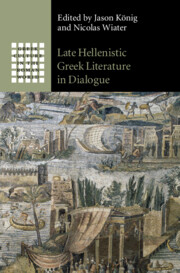Book contents
- Late Hellenistic Greek Literature in Dialogue
- Greek Culture in the Roman World
- Late Hellenistic Greek Literature in Dialogue
- Copyright page
- Contents
- Figure
- Contributors
- Preface
- Abbreviations
- Introduction
- Chapter 1 The Empire Becomes a Body
- Chapter 2 Pyrenaean Mountains and Deep-Valleyed Alps
- Chapter 3 Sailing the Sea, Sailing an Image
- Chapter 4 Ecocritical Readings in Late Hellenistic Literature
- Chapter 5 Civic and Counter-Civic Cosmopolitanism
- Chapter 6 The Wrath of the Sibyl
- Chapter 7 Imagining Belonging
- Chapter 8 Philosophical Self-Definition in Strabo’s Geography
- Chapter 9 Narrating ‘the Swarm of Possibilities’
- Chapter 10 ‘Asianist’ Style in Hellenistic Oratory and Philostratus’ Lives of the Sophists
- Chapter 11 Greek Reading Lists from Dionysius to Dio
- Chapter 12 Envoi
- References
- Index Locorum
- General Index
Chapter 8 - Philosophical Self-Definition in Strabo’s Geography
Published online by Cambridge University Press: 21 April 2022
- Late Hellenistic Greek Literature in Dialogue
- Greek Culture in the Roman World
- Late Hellenistic Greek Literature in Dialogue
- Copyright page
- Contents
- Figure
- Contributors
- Preface
- Abbreviations
- Introduction
- Chapter 1 The Empire Becomes a Body
- Chapter 2 Pyrenaean Mountains and Deep-Valleyed Alps
- Chapter 3 Sailing the Sea, Sailing an Image
- Chapter 4 Ecocritical Readings in Late Hellenistic Literature
- Chapter 5 Civic and Counter-Civic Cosmopolitanism
- Chapter 6 The Wrath of the Sibyl
- Chapter 7 Imagining Belonging
- Chapter 8 Philosophical Self-Definition in Strabo’s Geography
- Chapter 9 Narrating ‘the Swarm of Possibilities’
- Chapter 10 ‘Asianist’ Style in Hellenistic Oratory and Philostratus’ Lives of the Sophists
- Chapter 11 Greek Reading Lists from Dionysius to Dio
- Chapter 12 Envoi
- References
- Index Locorum
- General Index
Summary
This chapter examines two aspects of Strabo’s self-definition, both of which are indirect and reveal the twin preoccupations with intellectual distinction and political utility, especially in connection with the value of Greek education for the Roman imperial project. The geographical aspect of Strabo’s self-definition inscribes him in a tradition whereby Asia Minor is the main source of intellectual capital, from where it flows largely towards Rome. Strabo’s philosophical self-definition ranges much more widely than the doctrines of the Hellenistic schools: the Geography opens with an argument aimed at demonstrating that geography is a philosophical pursuit, which appeals to a tradition of wisdom going back to Homer. Geography’s philosophical credentials also include ‘wide learning’ (exemplified primarily in technical mathematical knowledge), as well as manifold benefits under the general umbrella of the ‘art of living’. The chapter nevertheless argues that there is more than ‘pseudo-philosophisation’ in Strabo’s work, in the form of clear Stoic echoes, albeit not centred around the theme of divine providence, where Strabo makes innovative, ‘un-Stoic’ remarks.
Keywords
- Type
- Chapter
- Information
- Late Hellenistic Greek Literature in Dialogue , pp. 231 - 250Publisher: Cambridge University PressPrint publication year: 2022

